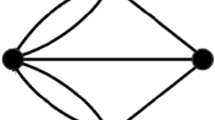Abstract
The principles of regular (invariable or stochastic) conjunction, of retarded action, determination, and causality, are stated exactly and analyzed. To this end, the concepts of system, property, state, and event, as well as those of conjunction (of events and of properties) are first elucidated. Four types of determination are distinguished and analyzed and it is shown that only one of them qualifies as a causal nexus, the others being deterministic (in the large sense) but noncausal. The overall conclusion is that, while the principles of regular conjunction, retarded action and determination are both distinct and universal, the causal principle is just a restricted version of the principle of determinacy.
Similar content being viewed by others
References
Bunge, M. (1959).Causality. Harvard University Press, Cambridge, Mass. Meridian Books, Cleveland and New York (1963).
Bunge, M. (1961). Causality, Chance, and Law.American Scientist,49, 432.
Bunge, M. (1962). Causality: A Rejoinder.Philosophy of Science,29, 306.
Bunge, M. (1963). A General Black Box Theory.Philosophy of Science,30, 343.
Author information
Authors and Affiliations
Rights and permissions
About this article
Cite this article
Bunge, M. Conjunction, succession, determination and causation. Int J Theor Phys 1, 299–315 (1968). https://doi.org/10.1007/BF00668670
Issue Date:
DOI: https://doi.org/10.1007/BF00668670



